
Malcolm Bligh Turnbull is an Australian former politician and businessman who served as the 29th prime minister of Australia from 2015 to 2018. He held office as leader of the Liberal Party of Australia and was the member of parliament (MP) for the New South Wales division of Wentworth from 2004 to 2018.
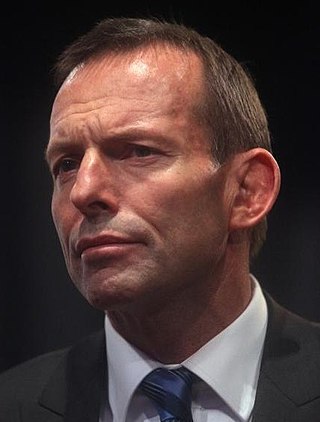
Anthony John Abbott is an Australian former politician who served as the 28th prime minister of Australia from 2013 to 2015. He held office as the leader of the Liberal Party of Australia and was the member of parliament (MP) for the New South Wales division of Warringah from 1994 to 2019.

Joseph Benedict Hockey is an Australian former politician and diplomat. He was the Member of Parliament for North Sydney from 1996 until 2015. He was the Treasurer of Australia in the Abbott government from 18 September 2013 until September 2015 when he resigned from Cabinet,having refused an alternative offer from the incoming prime minister,Malcolm Turnbull. He previously served as the Minister for Human Services and Minister for Employment and Workplace Relations in the Howard government. He also served as Ambassador of Australia to the United States from January 2016 until January 2020.
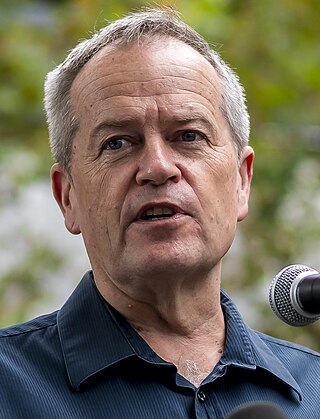
William Richard Shorten is an Australian former politician and trade unionist. He served as the leader of the opposition and leader of the Australian Labor Party (ALP) from 2013 to 2019. Shorten also held several ministerial portfolios in the Gillard,Rudd and Albanese governments from 2010 to 2025.
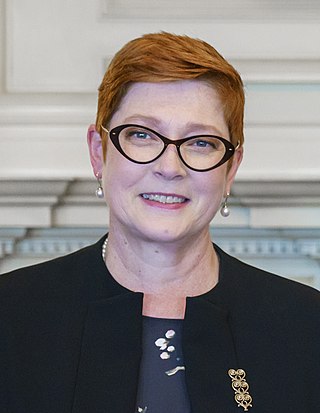
Marise Ann Payne is an Australian politician who was a Senator for New South Wales from 1997 until 2023,representing the Liberal Party. She held senior ministerial office in Coalition governments between 2013 and 2022,including as Minister for Defence (2015–2018) and Minister for Foreign Affairs (2018–2022).

Alexander George Hawke is an Australian politician who served as Minister for Immigration,Citizenship,Migrant Services and Multicultural Affairs from 2020 to 2022 in the Morrison government. Hawke has served as Member of Parliament (MP) for Mitchell since 2007,representing the Liberal Party.

Scott John Morrison is an Australian former politician who served as the 30th prime minister of Australia from 2018 to 2022. He held office as leader of the Liberal Party of Australia and was the member of parliament (MP) for the New South Wales division of Cook from 2007 until 2024.
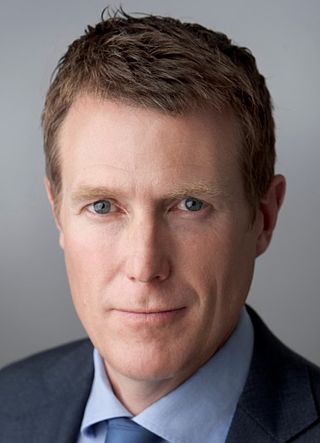
Charles Christian Porter is an Australian former politician and lawyer who served as the 37th Attorney-General of Australia from 2017 to 2021 in the Turnbull government and the subsequent Morrison government. He was a Member of Parliament (MP) for the Division of Pearce from 2013 to 2022 and a member of the Liberal Party of Australia. Porter also served as Leader of the House and Minister for Industrial Relations from 2019 to 2021,and Minister for Industry,Science and Technology in 2021 following his resignation as attorney-general.
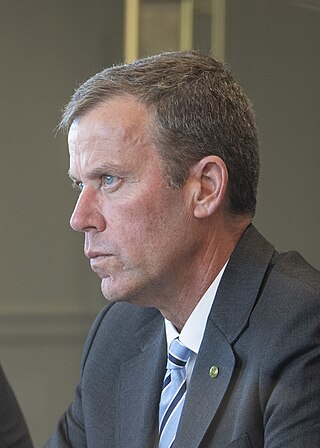
Daniel Thomas Tehan is an Australian politician. He is a member of the Liberal Party and has been a member of the House of Representatives since the 2010 election,representing the Victorian seat of Wannon. He held ministerial office in the Coalition governments under Malcolm Turnbull and Scott Morrison,serving as Minister for Defence Materiel (2016),Defence Personnel (2016–2017),Veterans' Affairs (2016–2017),Social Services (2017–2018),Education (2018–2020),and Trade,Tourism and Investment (2020–2022). He was a public servant and political adviser before entering parliament.

Craig Kelly is an Australian conservative politician who represented the division of Hughes as a Liberal Party MP from 2010 until his defeat at the 2022 federal election.

Alan Tudge is an Australian former politician. He was a Liberal Party member of the House of Representatives between 2010 and 2023. He was a cabinet minister in the Morrison government from 2019 to 2022.

Scott Andrew Buchholz is an Australian politician. He is a member of the Liberal National Party of Queensland (LNP) and served as an assistant minister in the Morrison government from 2018 until May 2022,following the appointment of the Albanese ministry. He has represented the seat of Wright since the 2010 federal election,sitting with the parliamentary Liberal Party,and previously served as chief government whip in the House of Representatives in the Abbott government in 2015. He was a businessman in the transport industry before entering politics.

David Bernard Coleman is an Australian politician. He is a member of the Liberal Party and was elected to the House of Representatives at the 2013 federal election,holding the New South Wales seat of Banks. Coleman served as the Assistant Minister to the Prime Minister for Mental Health and Suicide Prevention from December 2020 until May 2022. He previously served as Minister for Immigration,Citizenship,Migrant Services and Multicultural Affairs in the Morrison government from August 2018,although in December 2019 he took indefinite leave for personal reasons. He had earlier served as Assistant Minister for Finance in the Turnbull government from 2017 to 2018.

Michael Sven Sukkar is an Australian politician has served as the Shadow Minister for Housing,NDIS,and Social Services since 2022. Previously he had served as Assistant Treasurer and Minister for Housing and as the Minister for Homelessness,Social and Community Housing. Sukkar has been a member of the House of Representatives since September 2013,representing the Division of Deakin in Victoria for the Liberal Party.

The Turnbull government was the federal executive government of Australia led by the 29th prime minister of Australia,Malcolm Turnbull,from 2015 to 2018. It succeeded the Abbott government,which brought the Coalition to power at the 2013 Australian federal election. The government consisted of members of Australia's Liberal-Nationals Coalition. Turnbull took office by challenging his leader,Tony Abbott,in an internal leadership ballot. Warren Truss,the leader of the Nationals,served as deputy prime minister until he retired in 2016 and was replaced by Barnaby Joyce. Joyce resigned in February 2018 and the Nationals' new leader Michael McCormack became deputy prime minister. The Turnbull government concluded with Turnbull's resignation ahead of internal leadership ballot which saw him succeeded as prime minister by Scott Morrison and the Morrison government.

The 2019 Australian federal election was held on Saturday 18 May 2019 to elect members of the 46th Parliament of Australia. The election had been called following the dissolution of the 45th Parliament as elected at the 2016 double dissolution federal election. All 151 seats in the House of Representatives and 40 of the 76 seats in the Senate were up for election.
Julia Helen Banks is an Australian lawyer and politician. Elected as the member for Chisholm in the Australian House of Representatives at the 2016 federal election,Banks was the only candidate for the governing Liberal-National Coalition to win a seat held by an opposition party. The previous member,Labor's Anna Burke,had held the seat since 1998 and did not stand for re-election in 2016. Following the Liberal Party leadership spill in August 2018 that saw Prime Minister Malcolm Turnbull replaced by Scott Morrison,Banks stated she would not contest the 2019 federal election;and in November 2018 she announced she had quit the party to become an independent MP and sit on the crossbench. She unsuccessfully contested the seat of Flinders at the 2019 election,pitting her against government frontbencher Greg Hunt.

Leadership spills of the federal parliamentary leadership of the Liberal Party of Australia were held on 21 and 24 August 2018 and were called by the incumbent leader of the party,Prime Minister Malcolm Turnbull.

Matthew Anthony O'Sullivan is an Australian politician. He has been a Liberal Party of Australia member of the Australian Senate since 2019.
The Moderates,also known as Modern Liberals,Small-L Liberals or Liberal Left,are members,supporters,voters and a faction of the Australian Liberal Party who are typically economically,socially and environmentally liberal. The faction has been described as centre to centre-right.





















